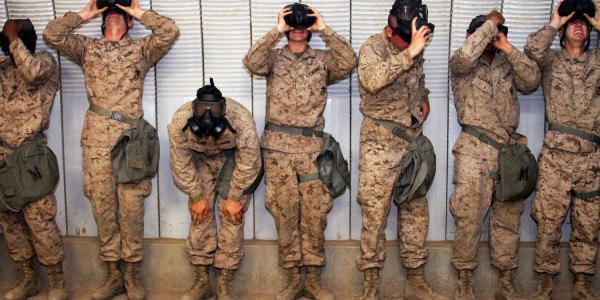

The Marine Corps on Monday ordered all its personnel to start wearing cloth face coverings to help prevent the spread of the novel coronavirus (COVID-19), but restricted Marines from wearing masks with higher levels of protection, such as surgical and N95 masks.
In an administrative message that followed a Pentagon order to wear face coverings, the Corps directed all individuals on its property and installations to wear cloth face coverings that are “conservative in appearance, not offensive, and conform to CDC guidance.”
Marines are encouraged to make their own face coverings, but are not allowed to “procure or wear” surgical masks or N95 masks, the message said, since those are “reserved for appropriate personnel.”
Among the do-it-yourself masks the Corps recommends are issued balaclavas, neck gaiters, or uniform green t-shirts fashioned into face coverings. Full masks, which the message said included surgical masks, N95 respirators, ski masks, and issued gas masks, “are not authorized.”

“Cloth face covers shall NOT be substituted with surgical masks or N-95 respirators,” the message said. “Surgical masks and N-95 respirators are personal protective equipment (PPE) and must be reserved for use in medical settings. Cloth face covers and PPE are integrated into a larger system of non-pharmaceutical interventions (NPIs) to limit transmission of infection.”
The message did not include exceptions for people who may have previously purchased their own surgical or N95 masks. A Marine official told Task & Purpose the order indeed restricted Marines from wearing masks that could potentially better protect them from the virus, even if they had been purchased before the outbreak.
“The Marine Corps considers N95 masks to be prioritized for medical personnel or first responders on the front lines of the pandemic response,” Capt. Joseph Butterfield, a Corps spokesman, told Task & Purpose in an emailed statement.
“The guidance outlined in the MARADMIN is intended to assist with the optimization strategies of the PPE supply chain published by the CDC. To the extent practical, the Marine Corps will support these strategies. The intent is to avoid Marines attempting to procure these supplies and further interrupting the supply chain.”
Surgical masks can block large-particle droplets, splashs, and sprays that may contain germs from reaching the mouth and nose, according to the FDA. Even better protection comes from N95 respirators, which fit closer to the face and can block at least 95% of very small particles.
The U.S. has seen a shortage in masks and other personal protective gear in the wake of the COVID-19 outbreak. The Federal Emergency Management Agency has nearly exhausted its own strategic reserve to supplement states’ dwindling stockpiles of protective equipment, while the Trump administration has used the Defense Production Act to mobilize private industry to make additional masks.
The Marine Corps had 78 confirmed cases of COVID-19 within its ranks as of Tuesday. There have been 2,449 total cases across the Department of Defense, and seven deaths.